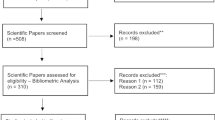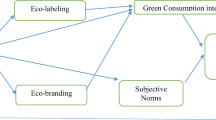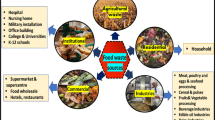Abstract
Since food waste can be viewed as an ethical issue, consumers may face an ethical dilemma when they decide to waste food. This study explores consumer views on wasting food using ethical decision-making model in a Chinese society, such as Taiwan. The findings of this study indicate that moral philosophy principles are significant predictors of ethical judgments about food waste, which in turn influence behavioral intentions. The impact power of deontological philosophy is stronger than that of teleological philosophy. Additionally, consumers with a high level of vertical individualism tend to view food waste as not violating their moral principles using deontological evaluation. The higher the horizontal individualism or the lower the values of materialism, the stronger the beliefs that food waste violates moral norms and imposes negative consequences on society and the environment. Finally, theoretical and practical contributions are offered as a basis for future studies.


Similar content being viewed by others
References
Ajzen, I. (1991). The theory of planned behavior. Organizational Behavior and Human Decision Processes, 50, 179–211.
Aschemann-Witzel, J., de Hooge, I., Amani, P., Bech-Larsen, T., & Oostindjer, M. (2015). Consumer-related food waste: Causes and potential for action. Sustainability, 7(6), 6457–6477.
Baumgartner, H., & Homburg, C. (1996). Applications of structural equation modeling in marketing and consumer research: A review. International Journal of Research in Marketing, 13(2), 139–161.
Belk, R. W. (1985). Materialism: Trait aspects of living in the material world. Journal of Consumer Research, 12(3), 265–280.
Blodgett, J. G., Lu, L. C., Rose, G. M., & Vitell, S. J. (2001). Ethical sensitivity to stakeholder interests: A cross-cultural comparison. Journal of the Academy of Marketing Science, 29(2), 190–202.
Bloom, J. (2011). American wasteland: How America throws away nearly half of its food (and what we can do about it). Cambridge, MA: Da Capo Lifelong.
Bock, D. E., Eastman, J. K., & Eastman, K. L. (2018). Encouraging consumer charitable behavior: The impact of charitable motivations, gratitude, and materialism. Journal of Business Ethics, 150(4), 1213–1228.
Bray, J., Johns, N., & Kilburn, D. (2011). An exploratory study into the factors impeding ethical consumption. Journal of Business Ethics, 98(4), 597–608.
Chang, H.-H., & Lu, L.-C. (2019). Actively persuading consumers to enact ethical behaviors in retailing: The influence of relational benefits and corporate associates. Journal of Business Ethics, 56(2), 399–416.
Chowdhury, R. M., & Fernando, M. (2013). The role of spiritual well-being and materialism in determining consumers’ ethical beliefs: An empirical study with Australian consumers. Journal of Business Ethics, 113(1), 61–79.
Chung, K. Y., Eichenseher, J. W., & Taniguchi, T. (2008). Ethical perceptions of business students: Differences between East Asia and the USA and among “Confucian” cultures. Journal of Business Ethics, 79(1–2), 121–132.
Dickson, M. (2005). Identifying and profiling apparel label users. In R. Harrison, T. Newholm, & D. Shaw (Eds.), The ethical consumer (pp. 155–172). London: Sage.
Flynn, L. R., Goldsmith, R. E., & Kim, W. M. (2013). A cross-cultural study of materialism and brand engagement. Journal of Multidisciplinary Research, 5(3), 49–69.
Fornell, C., & Larcker, D. F. (1981). Evaluating structural equation models with unobservable variables and measurement error. Journal of Marketing Research, 18(1), 39–50.
Fukukawa, K. (2003). A theoretical review of business and consumer ethics research: Normative and descriptive approaches. The Marketing Review, 3(4), 381–401.
Fukukawa, K., & Ennew, C. (2010). What we believe is not always what we do: An empirical investigation into ethically questionable behavior in consumption. Journal of Business Ethics, 91(1), 49–60.
Gaiani, S., Caldeira, S., Adorno, V., Segrè, A., & Vittuari, M. (2018). Food wasters: Profiling consumers’ attitude to waste food in Italy. Waste Management, 72, 17–24.
Gatley, A., Caraher, M., & Lang, T. (2014). A qualitative, cross cultural examination of attitudes and behaviour in relation to cooking habits in France and Britain. Appetite, 75, 71–81.
Gentina, E., Shrum, L. J., Lowrey, T. M., Vitell, S. J., & Rose, G. M. (2018). An integrative model of the influence of parental and peer support on consumer ethical beliefs: The mediating role of self-esteem, power, and materialism. Journal of Business Ethics, 150(4), 1173–1186.
Gouveia, V. V., Clement, M., & Espinosa, P. (2003). The horizontal and vertical attributes of individualism and collectivism in a Spanish population. The Journal of Social Psychology, 143(1), 43–63.
Graham-Rowe, E., Jessop, D. C., & Sparks, P. (2019). Self-affirmation theory and pro-environmental behaviour: Promoting a reduction in household food waste. Journal of Environmental Psychology, 62, 124–132.
Haines, R., Street, M. D., & Haines, D. (2008). The influence of perceived importance of an ethical issue on moral judgment, moral obligation, and moral intent. Journal of Business Ethics, 81(2), 387–399.
Hair, J. F., Anderson, R. E., Tatham, R. L., & Black, W. C. (2009). Multivariate Data Analysis (7th edition). New Jersey: Prentice-Hall Inc..
Hofstede, G. (1980). Culture’s consequences: International differences in work-related values. Beverly Hills, CA: Sage.
Hofstede, G. (1991). Cultures and organizations: Software of the mind. London: McGraw Hill.
Hofstede, G. (1993). Cultural constraints in management theories. Academy of Management Perspectives, 7(1), 81–94.
Huang, C. C., Lu, L. C., You, C. S., & Yen, S. W. (2012). The impacts of ethical ideology, materialism, and selected demographics on consumer ethics: An empirical study in China. Ethics & Behavior, 22(4), 315–331.
Hunt, S. D., & Vitell, S. J. (1986). A general theory of marketing ethics. Journal of Macromarketing, 6(1), 5–16.
Hunt, S. D., & Vitell, S. J. (1993). The general theory of marketing ethics: A retrospective and revision. In N. C. Smith & J. A. Quelch (Eds.), Ethics in marketing (pp. 775–784). Homewood, IL: Irwin Inc..
Hunt, S. D., & Vitell, S. J. (2006). The general theory of marketing ethics: A revision and three questions. Journal of Macromarketing, 26(2), 143–153.
Husted, B. W., & Allen, D. B. (2008). Toward a model of cross-cultural business ethics: The impact of individualism and collectivism on the ethical decision-making process. Journal of Business Ethics, 82, 293–305.
Kilbourne, W., & Pickett, G. (2008). How materialism affects environmental beliefs, concern, and environmentally responsible behavior. Journal of Business Research, 61(9), 885–893.
Lebersorger, S., & Schneider, F. (2011). Discussion on the methodology for determining food waste in household waste composition studies. Waste Management, 31(9), 1924–1933.
Lee, M. S., & Ahn, C. S. Y. (2016). Anti-consumption, materialism, and consumer well-being. Journal of Consumer Affairs, 50(1), 18–47.
Leonidou, L. C., Kvasova, O., Leonidou, C. N., & Chari, S. (2013). Business unethicality as an impediment to consumer trust: The moderating role of demographic and cultural characteristics. Journal of Business Ethics, 112(3), 397–415.
Li, N., & Wang, J. (2020). Food waste of Chinese cruise passengers. Journal of Sustainable Tourism, 28(11), 1825–1840.
Liu, Y., Zhao, X., & Liu, Y. (2018). Stress and unethical consumer attitudes: The mediating role of construal level and materialism. Personality and Individual Differences, 135, 85–91.
Lu, L. C., & Lu, C. J. (2010). Moral philosophy, materialism, and consumer ethics: An exploratory study in Indonesia. Journal of Business Ethics, 94(2), 193–210.
Lu, L. C., Rose, G. M., & Blodgett, J. G. (1999). The effects of cultural dimensions on ethical decision making in marketing: An exploratory study. Journal of Business Ethics, 18, 91–105.
Lu, L. C., Chang, H. H., & Chang, A. (2015). Consumer personality and green buying intention: The mediate role of consumer ethical beliefs. Journal of Business Ethics, 127(1), 205–219.
McDonald, H., & Adam, S. (2003). A comparison of online and postal data collection methods in marketing research. Marketing Intelligence and Planning, 21(2), 85–95.
Mitchell, V. W., & Ka Lun Chan, J. (2002). Investigating UK consumers' unethical attitudes and behaviours. Journal of Marketing Management, 18(1–2), 5–26.
Nunnally, J., & Bernstein, I. (1994). Psychometric theory. New York: McGraw-Hill.
Pakpour, A. H., Zeidi, I. M., Emamjomeh, M. M., Asefzadeh, S., & Pearson, H. (2014). Household waste behaviours among a community sample in Iran: An application of the theory of planned behaviour. Waste Management, 34(6), 980–986.
Papargyropoulou, E., Lozano, R., Steinberger, J. K., Wright, N., & bin Ujang, Z. (2014). The food waste hierarchy as a framework for the management of food surplus and food waste. Journal of Cleaner Production, 76, 106–115.
Parizeau, K., von Massow, M., & Martin, R. (2015). Household-level dynamics of food waste production and related beliefs, attitudes, and behaviours in Guelph, Ontario. Waste Management, 35, 207–217.
Pirsch, J., Gupta, S., & Grau, S. L. (2007). A framework for understanding corporate social responsibility programs as a continuum: An exploratory study. Journal of Business Ethics, 70(2), 125–140.
Podoshen, J. S., & Andrzejewski, S. A. (2012). An examination of the relationships between materialism, conspicuous consumption, impulse buying, and brand loyalty. Journal of Marketing Theory and Practice, 20(3), 319–334.
Podsakoff, P. M., & Organ, D. W. (1986). Self-reports in organizational research: Problems and prospects. Journal of Management, 12(4), 531–544.
Podsakoff, P. M., MacKenzie, S. B., Lee, J. Y., & Podsakoff, N. P. (2003). Common method biases in behavioral research: A critical review of the literature and recommended remedies. Journal of Applied Psychology, 88(5), 879–903.
Quested, T. E., Marsh, E., Stunell, D., & Parry, A. D. (2013). Spaghetti soup: The complex world of food waste behaviours. Resources, Conservation and Recycling, 79, 43–51.
Reidenbach, R. E., & Robin, D. P. (1988). Some initial steps toward improving the measurement of ethical evaluations of marketing activities. Journal of Business Ethics, 7(11), 871–879.
Richins, M. L., & Dawson, S. (1992). A consumer values orientation for materialism and its measurement: Scale development and validation. Journal of Consumer Research, 19(3), 303–316.
Segev, S., Shoham, A., & Gavish, Y. (2015). A closer look into the materialism construct: The antecedents and consequences of materialism and its three facets. Journal of Consumer Marketing, 32(2), 85–98.
Shrum, L. J., Wong, N., Arif, F., Chugani, S. K., Gunz, A., Lowrey, T. M., et al. (2013). Reconceptualizing materialism as identity goal pursuits: Functions, processes, and consequences. Journal of Business Research, 66(8), 1179–1185.
Singelis, T. M., Triandis, H. C., Bhawuk, D. P. S., & Gelfand, M. J. (1995). Horizontal and vertical dimensions of individualism and collectivism: A theoretical and measurement refinement. Cross-Cultural Research, 29(3), 240–275.
Singhapakdi, A., Vitell, S. J., & Kraft, K. L. (1996). Moral intensity and ethical decision-making of marketing professionals. Journal of Business Research, 36(3), 245–255.
Sivadas, E., Bruvold, N. T., & Nelson, M. R. (2008). A reduced version of the horizontal and vertical individualism and collectivism scale: A four-country assessment. Journal of Business Research, 61(3), 201–210.
Smith, C. N. (1995). Marketing strategies for the ethics era. Sloan Management Review, 36(4), 85–97.
Stancu, V., Haugaard, P., & Lähteenmäki, L. (2016). Determinants of consumer food waste behaviour: Two routes to food waste. Appetite, 96, 7–17.
Stefan, V., Van Herpen, E., Tudoran, A. A., & Lähteenmäki, L. (2013). Avoiding food waste by Romanian consumers: The importance of planning and shopping routines. Food Quality and Preference, 28(1), 375–381.
Strasser, S. (1999). Waste and want: A social history of trash. NY: Metropolitan Books.
Thyberg, K. L., & Tonjes, D. J. (2016). Drivers of food waste and their implications for sustainable policy development. Resources, Conservation and Recycling, 106, 110–123.
Triandis, H. C., & Gelfand, M. J. (1998). Converging measurement of horizontal and vertical individualism and collectivism. Journal of Personality and Social Psychology, 42, 118–128.
Tucker, C. A., & Farrelly, T. (2016). Household food waste: The implications of consumer choice in food from purchase to disposal. Local Environment, 21(6), 682–706.
van der Werf, P., Seabrook, J, A., & Gilliland, J, A. (2019). “Reduce food waste, save money”: Testing a novel intervention to reduce household food waste. Environment and Behavior, DOI: https://doi.org/10.1177/0013916519875180.
Visschers, V. H., Wickli, N., & Siegrist, M. (2016). Sorting out food waste behaviour: A survey on the motivators and barriers of self-reported amounts of food waste in households. Journal of Environmental Psychology, 45, 66–78.
Vitell, S. J. (2003). Consumer ethics research: Review synthesis and suggestions for the future. Journal of Business Ethics, 43(1–2), 33–47.
Vitell, S. J., Singhapakdi, A., & Thomas, J. (2001). Consumer ethics: An application and empirical testing of the Hunt-Vitell theory of ethics. Journal of Consumer Marketing, 18(2), 153–178.
Wastes & Resources Action Programme (WRAP). (2009). Household food and drink waste in the UK, report prepared by WRAP. Banbury: WRAP.
Weaver, G. R., & Treviño, L. K. (2009). Normative and empirical business ethics. Business Ethics Quarterly, 4(2), 129–143.
Williams, H., Wikström, F., Otterbring, T., Löfgren, M., & Gustafsson, A. (2012). Reasons for household food waste with special attention to packaging. Journal of Cleaner Production, 24, 141–148.
Acknowledgements
The author would like to thank the Ministry of Science and Technology, Taiwan, R.O.C., for financially supporting this research under Grant No. MOST 106-2410-H-035-014. The author highly appreciates the editors and the reviewers’ constructive suggestion.
Funding
This study was funded by The Ministry of Science and Technology, Taiwan, R.O.C. (Grant number MOST 106–2410-H-035-014).
Author information
Authors and Affiliations
Corresponding author
Ethics declarations
Conflict of Interest
The author has received research grants from The Ministry of Science and Technology, Taiwan, R.O.C. (grant number MOST 106–2410-H-035-014).
Ethical Approval
All procedures performed in studies involving human participants were in accordance with the ethical standards of the institutional and/or national research committee and with the 1964 Helsinki declaration and its later amendments or comparable ethical standards.
Informed Consent
Informed consent was obtained from all individual participants included in the study.
The datasets analyzed during the current study are available from the corresponding author on reasonable request.
Additional information
Publisher’s Note
Springer Nature remains neutral with regard to jurisdictional claims in published maps and institutional affiliations.
Supplementary Information
ESM 1
(DOCX 62.9 kb)
Appendix 1 The measurement items
Appendix 1 The measurement items
Food waste behavioral intention.
1. I would have done food waste behaviors.
2. If I find someone else has food waste behaviors, I would do the same thing.
3. In life, I would have a decision-making to waste food.
4. I would never do food waste behaviors.*.
Ethical judgment toward food waste.
1. Food waste is acceptable to my family.
2. Food waste is fair.
3. Food waste is just.
4. Food waste is moral.
Deontological evaluation toward food waste.
1. Food waste is consistent with my moral norms.*.
2. It would be morally right for me to waste food.*.
3. Food waste is in line with my ethical values.*.
4. I would feel guilty if I waste food.
5. To waste food goes against my principles.
Teleological evaluation toward food waste.
1. Food waste would have a negative impact on society.
2. Food waste would cause serious harm to others.
3. Food waste would have a negative impact on the ecological environment.
4. Food waste would cause serious damage to the ecological environment.
Vertical individualism.
1. It annoys me when other people perform better than I do.
2. Competition is the law of nature.
3. When another person does better than I do, I get tense and aroused.
4. Winning is everything.
5. It is important that I do my job better than others.
6. I enjoy working in situations involving competition with others.
7. Some people emphasize winning, I’m not one of them.*.
Horizontal individualism.
1. I often do “my own thing”.
2. One should live one’s life independently of others.
3. I like my privacy.
4. I prefer to be direct and forthright when discussing with people.
5. I am a unique individual.
6. What happens to me is my own doing.
7. When I succeed, it is usually because of my abilities.
8. I enjoy being unique and different from others in many ways.
Materialism – Central.
1. I usually buy only the things I need.*.
2. I try to keep my life simple, as far as possessions are concerned.*.
3. The things I own aren’t all that important to me.*.
4. I enjoy spending money on things that aren’t practical.
5. Buying things gives me a lot of pleasure.
6. I like a lot of luxury in my life.
7. I put less emphasis on material things than most people I know.*.
Materialism – Happiness.
1. I have all the things I really need to enjoy life.*.
2. My life would be better if I owned certain things I don’t have.
3. I wouldn’t be any happier if I owned nicer things.*.
4. I’d be happier if I could afford to buy more things.
5. It sometimes bothers me quite a bit that I can’t afford to buy all the things I’d like.
Materialism – Success.
1. I admire people who own expensive homes, cars, and clothes.
2. Some of the most important achievements in life include acquiring material possessions.
3. I don’t place much emphasis on the amount of material objects people own as a sign of success.*.
4. The things I own say a lot about how well I’m doing in life.
5. I like to own things that impress people.
6. I don’t pay much attention to the material objects other people own.*.
*Reverse scored.
Rights and permissions
About this article
Cite this article
Chang, HH. Is it unethical to waste food? exploring consumer’s ethical perspectives and waste intentions. Curr Psychol 41, 8434–8448 (2022). https://doi.org/10.1007/s12144-020-01257-3
Accepted:
Published:
Issue Date:
DOI: https://doi.org/10.1007/s12144-020-01257-3




